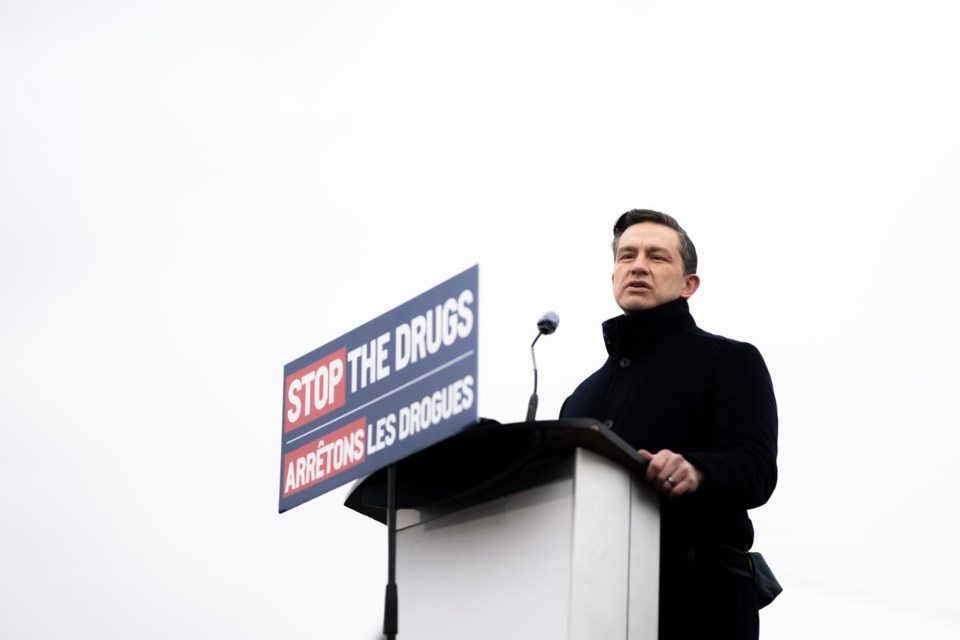OTTAWA — The federal Conservatives are promising to crack down on "fentanyl kingpins" by bringing in mandatory life sentences for those convicted of trafficking, producing or exporting more than 40 mg of the drug.
"Let's call fentanyl trafficking what it is: mass murder," Conservative Leader Pierre Poilievre told a news conference in Vancouver on Wednesday.
He compared selling the drug to "spraying bullets into a crowd."
The party says that under a Conservative government, traffickers caught with between 20 mg and 40 mg of pure fentanyl would be sentenced to a mandatory 15 years in prison.
To do that, Poilievre said he would repeal changes made to the Criminal Code and the Controlled Drugs and Substances Act in 2022 that ended some mandatory minimum sentences and allowed for conditional sentences or diversion programs for simple possession convictions.
Those changes were made by the Liberal government after the Supreme Court of Canada struck down a number of mandatory minimum penalties in the Controlled Drugs and Substances Act in a 2016 decision, ruling they were unconstitutional.
Poilievre said he interprets the law differently.
"What I am proposing today is not only allowed under the Charter, it is required by the Charter," he said, when asked whether the Conservatives would use the Constitution's notwithstanding clause to shield such a law from a legal challenge.
He said "locking up the mass murderers that bring these drugs in" would protect Canadians' Section 7 rights to life, liberty and the security of the person.
He noted that 49,000 Canadians have died of opioid overdoses since 2016. The U.S. Drug Enforcement Administration says two milligrams can kill a person. Health Canada says "a few grains" can be deadly.
Sen. Kim Pate, who previously taught law at three universities and has advocated against mandatory minimum penalties, said she would like to know what kind of legal advice Poilievre is getting.
"Why would you turn back the clock and do something that has already cost Canadians millions and millions of dollars — first to enact those laws, put people in prison, then to have legal challenges and then enact new laws?" she said.
A law imposing mandatory life sentences would almost certainly be challenged in court, the Canadian Civil Liberties Association said.
Shakir Rahim, a lawyer and director of the criminal justice program at the CCLA, said Canadian law already allows for a life sentence to be imposed for fentanyl trafficking and "significant double-digit sentences" are handed down regularly by the courts.
Rahim said the broad definition of trafficking in the Criminal Code — which includes situations where someone gives another person drugs for a social purpose, or has a person hold drugs with no intent to sell them — is the reason mandatory minimum penalties have been deemed unconstitutional.
"It is going to capture people who either are experiencing a substance addiction or are otherwise highly vulnerable and not the kind of culpable actors, the kingpins," he said.
Fentanyl trafficking has been in the spotlight since U.S. President Donald Trump took office threatening to impose 25 per cent tariffs on Canada and Mexico because of what he said was the countries' failure to keep the drug from entering the U.S.
He signed an executive order on Saturday that declared the flow of illegal drugs and migrants into the U.S. a national security risk, and used that emergency to order sweeping tariffs on Canadian goods.
After Prime Minister Justin Trudeau outlined Canada's plan to boost border security and appoint a "fentanyl czar" in two calls with Trump on Monday, the president reversed course and delayed the implementation of tariffs for a month.
Poilievre said that regardless of whether people agree with Trump's rationale for threatening tariffs, Canada shouldn't be taking action "just to please him."
He also dismissed the Liberals' move to appoint a "fentanyl czar" as "performative."
The Conservative leader said action must be taken to protect Canadians from an overdose crisis.
"We will come to the rescue of victims and addicts, we will provide life-saving treatment," Poilievre said.
He pledged a Conservative government would take people off the streets and provide residential treatment, including sweat lodges for Indigenous people addicted to opioids.
He has said previously he would defund programs that provide prescribed narcotics to people facing a heightened risk of overdosing due to a toxic street drug supply.
Poilievre has been critical of the term "safer supply" and has said such programs allow users to sell prescribed alternatives like hydromorphone on the street.
The Conservative leader also has expressed support for the idea of mandatory, involuntary drug treatment for minors and people in prison.
Pate said if the tough-on-crime approach offered an answer, "then we should just look to the United States and they would have solved this problem long ago."
"If any government really wanted to take on some of these issues, they would look at the economic inequality that feeds these issues. They would look at how homelessness, poverty and addictions and mental health issues intersect," she said.
She also said changes are needed to tackle problems like tax evasion and money laundering among criminal organizations.
Justice Minister Arif Virani did not answer questions about Poilievre's proposal on Wednesday.
This report by The Canadian Press was first published Feb. 5, 2025.
Sarah Ritchie and David Baxter, The Canadian Press



